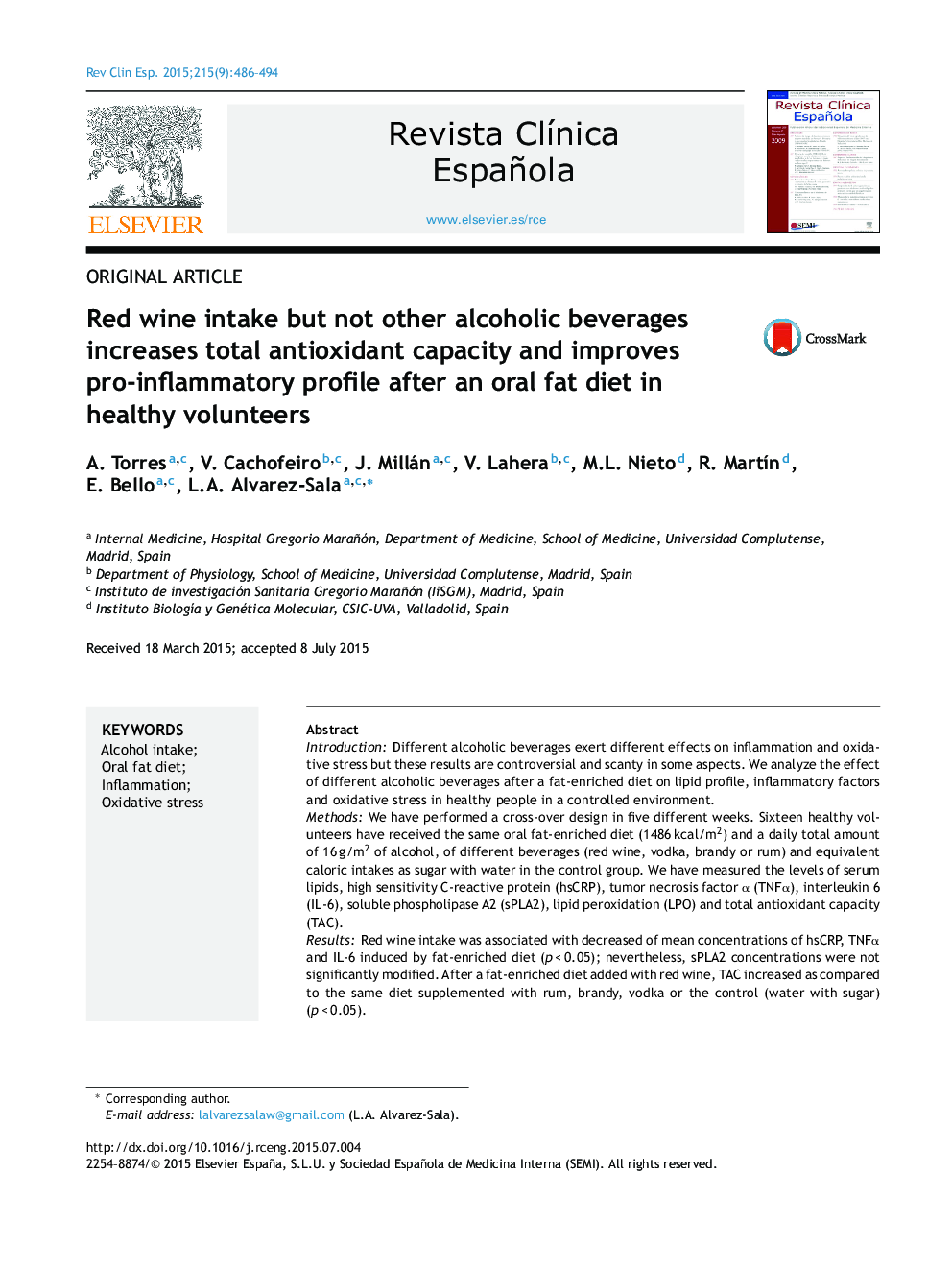| کد مقاله | کد نشریه | سال انتشار | مقاله انگلیسی | نسخه تمام متن |
|---|---|---|---|---|
| 3829880 | 1247145 | 2015 | 9 صفحه PDF | دانلود رایگان |
IntroductionDifferent alcoholic beverages exert different effects on inflammation and oxidative stress but these results are controversial and scanty in some aspects. We analyze the effect of different alcoholic beverages after a fat-enriched diet on lipid profile, inflammatory factors and oxidative stress in healthy people in a controlled environment.MethodsWe have performed a cross-over design in five different weeks. Sixteen healthy volunteers have received the same oral fat-enriched diet (1486 kcal/m2) and a daily total amount of 16 g/m2 of alcohol, of different beverages (red wine, vodka, brandy or rum) and equivalent caloric intakes as sugar with water in the control group. We have measured the levels of serum lipids, high sensitivity C-reactive protein (hsCRP), tumor necrosis factor α (TNFα), interleukin 6 (IL-6), soluble phospholipase A2 (sPLA2), lipid peroxidation (LPO) and total antioxidant capacity (TAC).ResultsRed wine intake was associated with decreased of mean concentrations of hsCRP, TNFα and IL-6 induced by fat-enriched diet (p < 0.05); nevertheless, sPLA2 concentrations were not significantly modified. After a fat-enriched diet added with red wine, TAC increased as compared to the same diet supplemented with rum, brandy, vodka or the control (water with sugar) (p < 0.05).ConclusionsModerate red wine intake, but not other alcoholic beverages, decreased pro-inflammatory factors and increased total antioxidant capacity despite a fat-enriched diet intake in healthy young volunteers.
ResumenIntroducciónEl efecto de las bebidas alcohólicas sobre la inflamación y el estrés oxidativo es variable y solo parcialmente conocido.Objetivo: analizar el efecto de diferentes bebidas alcohólicas sobre el perfil lipídico, factores de inflamación y estrés oxidativo en personas sanas con ingesta de una dieta enriquecida en grasas.MétodosSe diseñó un estudio cruzado durante cinco semanas. Dieciséis voluntarios sanos recibieron la misma dieta enriquecida con grasa oral (1.486 kcal/m2) más 16 g/m2 de alcohol diarios, consumido como vino tinto, vodka, brandy o ron, o un equivalente calórico en el grupo control (azúcar y agua). Se midieron lípidos en suero, proteína C reactiva de alta sensibilidad (PCR-as), factor de necrosis tumoral (TNF) α, interleucina 6 (IL-6), fosfolipasa A2 soluble (sPLA2), la peroxidación lipídica (LPO) y la capacidad antioxidante total (TAC).ResultadosLa ingesta de vino tinto se asoció con una disminución significativa de las concentraciones de PCR-as, TNFα e IL-6, inducida por una dieta rica en grasas (p <0,05). Las concentraciones de sPLA2 no se modificaron. El consumo de vino tinto, aún con una dieta rica en grasas, aumentó la capacidad antioxidante total comparada con el ron, brandy, vodka o el control (agua con azúcar) (p <0,05).ConclusionesLa ingesta moderada de vino tinto, pero no de otras bebidas alcohólicas, disminuyó las concentraciones de factores proinflamatorios y aumentó la capacidad antioxidante total, a pesar de la dieta enriquecida en grasa en voluntarios jóvenes sanos.
Journal: Revista Clínica Española (English Edition) - Volume 215, Issue 9, December 2015, Pages 486–494
